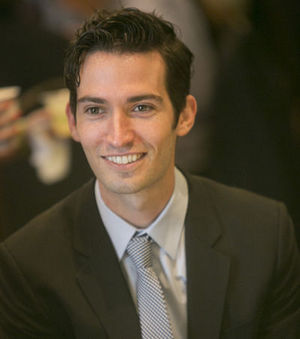
By Andrew Cohen
For Sax Prize winner Micah West ’13, the path to clinical advocacy has been intensely personal. When West was 19, his father pled guilty to two felonies: health care fraud and selling prescription drugs. He lost his medical license and received a one-year sentence to a halfway house.
“I don’t think I appreciated then how much my father’s conviction would touch so many areas of his life, or that the criminal justice system would impact my family even 10 years after his release,” West said during a riveting acceptance speech on April 15 at the Bancroft Hotel. “I didn’t appreciate that my own freedom was bound up in my father’s non-freedom; that what happens inside in a cage haunts the lives of those who live outside it; that I could no more walk away from my father than I could any of the millions incarcerated in this country.”
West’s tireless dedication to the plight of the downtrodden wasn’t lost on faculty seeking outstanding advocates for the Sax Prize. The annual award, named for the late Brian Sax ’69, a respected San Francisco litigator and Berkeley Law lecturer, is given to a graduating legal clinic student who displays excellence in advocacy and professional judgment. A faculty committee chose West from a group of nominees who worked at the law school’s various legal clinics.
Professor and Death Penalty Clinic Director Elisabeth Semel emceed the awards ceremony, during which Professor and Acting Dean Gillian Lester praised all the nominees for “accomplishments that embody the very best parts of reflective lawyering.” Some of Berkeley Law’s leading clinical professors—Death Penalty Clinic Associate Director Ty Alper, International Human Rights Law Clinic Associate Director Roxanna Altholz ’99, East Bay Community Law Center (EBCLC) Executive Director Tirien Steinbach ’99, and Samuelson Law, Technology & Public Policy Clinic Co-Director Jennifer Urban ’00—described their students’ wide-ranging achievements over the past year.
Shaped by his formative experience, West dived into Berkeley Law’s clinical program. As a second-year student, he worked tirelessly for the Death Penalty Clinic. He then led a determined effort to create a juvenile justice clinic within EBCLC—the Youth Defender Clinic—which launched in the fall.
Lecturer Kate Weisburd, who supervised West at both the Death Penalty Clinic and Youth Defender Clinic, said he “always displayed a deep commitment to doing the best work possible and leaving no stone unturned, no matter how unglamorous the task.”
At the Death Penalty Clinic, West worked on a capital appeal in which the client had two trials over a span of almost 10 years. “This translated into hundreds of motions and exhibits contained in thirteen banker’s boxes spread over three clerks’ offices,” Weisburd said. “None of the documents were in any sort of order. Micah led a team effort to review each and every page and make sense of the madness. Thanks to these efforts, new issues were discovered and are now being litigated.”
West also drafted and filed pleadings in superior court and made several trips to Georgia to investigate files and interview witnesses. In doing so, he learned first-hand how unfairly tilted the scales of justice can be.
“We live in a country where race and class profoundly shapes who dies, who lives, and under what conditions,” West said. “The Death Penalty Clinic taught me just how literal this is. In America, you’re 11 times more likely to receive the death penalty if the victim is white than if the victim is black, and 22 times more likely to receive the death penalty if the defendant is black and the victim is white. Our legal system is complicit in these deaths.”
A seriousness of purpose
In developing the Youth Defender Clinic, West worked with Weisburd and Steinbach to create a pragmatic vehicle for representing young people involved in Alameda County’s juvenile justice system. The clinic seeks to stop the “school-to-prison pipeline” on an individual, institutional, and community level by addressing the causes and consequences of court involvement. It represents youths in delinquency and related civil proceedings, such as school expulsion, special education, housing, immigration, criminal record sealing, and benefits proceedings.
Weisburd said West treated each proceeding “as if it were a capital murder case. In one expulsion case, he obtained nine letters of support from teachers in the school. The Oakland Unified School Discipline Panel had never seen any defense like this before.” The client prevailed at the hearing and is back in school.
West thanked Berkeley Law’s clinic leaders for teaching him the “privilege” of representing indigent clients. “Quite simply, the clinics taught me how to be a lawyer. I now bring to my work a seriousness of purpose that stems from the understanding that the need is great, the time is short, and our own survival is bound to the survival of everyone else,” he said.
Runner-up Diana Rashid ’13 received the Sax Prize honorable mention award for her work with the International Human Rights Law Clinic and its DREAMers at Cal Project, the legal component of the nation’s first undocumented student program. It was created last year to provide services to the roughly 200 undocumented students at UC Berkeley. Rashid worked with more than half of them while conducting workshops, screening cases, and recruiting pro bono lawyers.
—
Photographs from the Awards Ceremony